Music Reviews
Adrift on a Sea of Blues - Gill Sweeting and the Blue Cheese Tarts

After last year's award nomination for this group, I had high expectations of the nights entertainment - and I was not disappointed.
Gill and her loyal band of musicians have built up quite a following in Buxton. The standard of musicianship is high, showing a clear understanding of the blues genre in all its forms.
After a delayed start, the sleazy opener was followed by a contrasting k.d.lang number with a feature sax solo - nice! Other numbers in this set of 10 demonstrated the electric guitar finesse of Dave Morton, and the mature pure vocals of Bernie DeCent (I did think Gill was moving into Macy Gray vocal territory during Easy Street.) The slow ballad Baby Mine gave Bernie the lead vocal to really show her talent against a guitar riff. Another slow ballad Head had a very atmospheric intro and now Gill was in her groove - adding a smouldering vocal. The first half finished with John ('play in any key') McGrother leaving the sound desk to get behind the keyboard and Jim Davie moving to the mike for a couple of great boogie/'easy street' blues numbers bringing the band to a full complement of 7 plus two vocalists - excellent!
Now refreshed, the band opened the second half with a French set a la Edith Piaf, with Gill playing the accordion. Contrasting
this was the slow Weary Blues number with sax and accordion breaks - strangely like 'House of the Rising Sun'? Gills softer side came out with the heartfelt lyrics in Between the Bars - a song dedicated the plight of alcoholics. The set continued with a variety of folk ballad and 'deep and dirty' blues, some nice electric guitar playing, more vocals from Jim and Johnnie's miner's lamp! To end the set we had the humorous My Blue Heaven/Monkey song segue featuring Johnie on vocals, 'scooby do itchy coo' backing vocals and the well-known Jungle Book song 'wanna be like you' - a great hah-hah crowd pleaser! A bluesy stomp ended the night barring the inevitable encore.
This gig is a great value 'foot-tapping' night out in a fitting venue, with proceeds going to Blythe House. So if you missed this, do get down on Friday night - enjoy yourself and support a great cause too - this is truly a highlight event on the Fringe.
Fans of the folk/blues scene in Buxton will fondly remember Chris Rockliffe, who would have loved this gig. In his memory, CDs were for sale at the Grove - very good value and a fitting tribute to the man and his music. Do visit to bag your copy, I can recommend it.
Martin Bisknell
Are We There Yet? - Dawn Foxall, Diana Sharp & pianist David Barnard

The operatic concerts I've reviewed for previous Fringes have not always been happy affairs. Sometimes I've felt that the choice of music was a bit samey, a bit obscure, a bit more for the performers than for the audience, the delivery a bit staid.
Not so Are We There Yet. In this lively and hugely entertaining concert, Dawn Foxall (mezzo) and Diana Sharp (soprano) attempt to travel from Buxton to Las Vegas, but are forced to make numerous detours along the way, leading to a delightful collection of songs encompassing operatic favourites (Carmen, Cosi Fan Tutte, even Nessun Dorma) as well as a Bond theme (From Russia With Love) and show tunes (Don't Tell Mama from Cabaret and a terrific collision of Surrey With The Fringe On Top (appropriately), The Sound of Music and Climb Every Mountain. Musically delightful, and beautifully song, the girls also bring great humour and showmanship to each piece, in which they are aided and abetted by their skilful accompanist, David Barnard, in the role of camp cabin crew from various nations.
My only regret was that, following confusion on my part as to the venue, I missed the first few minutes, since I enjoyed the rest of the show so much. Highly recommended.
Robbie Carnegie
Around the World in 60 Minutes - Tim Mottershead
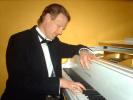
The title says it succinctly and Tim Mottershead delivers. This is a tour of the world using for the most part 20th century classical pieces. Beginning in Armenia and ending in Spain this recital showcases some of the genre's perhaps lesser-known composers and their works.
There are works from Europe, the Middle East, China and Cuba which are complimented by some of Tim's own compositions and he delivers all with aplomb. His introduction to one piece drew a gasp of astonishment and a 'gosh' of anticipation from the lady next to me - so the audience was impressed!
This is a recital that listeners to radio stations such as R3 and Classic FM would enjoy, as indeed would anyone with an interest in 'World Music'. Bravo!
Ian Heath
Crazed and In Love - Rebecca Lea (soprano) Tom Wilkinson (piano)

This delightful recital was an oasis of beauty and harmony just metres away from the garish, raucous fair on the market place.
Taking its theme as the all the manifestations of love, the programme varied in period and style from 17th to 18th Century songs by Purcell and Rameau through to modern cabaret numbers by Bolcolm and Britten.
Soprano Rebecca Lea shows an impressive vocal range which conveys the joy of Rameau's Accourez riante jeunesse, the despair of Mozart's Ach, Ich fühl's, and the indignation of Bolcolm's Over the Piano with great emotional truth. She has, moreover, a very confident stage presence, and is in as much command of her gesture, posture and facial expressions as she is of her voice. A delight to the eye as well as to the ear.
Pianist Tom Wilkinson is very much in harmony with Rebecca, literally of course, but as importantly in mood. This is partnership not just accompaniment whether it's the distinct but dramatically linked parts played in the heart-stopping duo of Britten's Stop the Clocks, or the aching fusion of voice and piano achieved in Wolf's Das verlassene Magdlein.
Music items on the Fringe tend to be 'one-offs'. This is a shame. I'd recommend Rebecca and Tom's recital as a Fringe 'must-see' if there were an opportunity to go again.
Barbara Wilson
Don't Fret - Underground Events
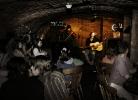
After a day with the Fringe float in, shall we say, questionable weather, with posters and crepe paper flowers disintegrating all round me, I was the ideal candidate to be de-stressed at one of Underground's valuable chill-out music sessions.
Don't Fret, on for two Saturdays of the Fringe, is billed as a drop-in-when-you-feel- like-it-event and by the time I arrived gasping over my gin and tonic, I had missed something involving an accordion but was still in time to enjoy Buxton guitarist and indeed Fringe float musician Nick Butterley with his electric guitar (protesting only a little from the sudden change in temperature after a couple of hours in the cold). Nick has a lovely mellow style and produced an eclectic mix of enjoyable folk songs on subjects ranging from tender love to the intricacies of astronomy. There was also an arresting, a cappella variation on an old favourite, Prickle Eye Bush, in which a condemned man awaits rescue from various family members who fail to produce sufficient gold or silver to save him from the noose.
After an interval sufficient to purchase some delicious salt and cracked black pepper crisps to aid my recovery process, the mood changed as some drummers arrived, each with an incurable percussive habit that resulted in them not only drumming but clapping, slapping cheeks and tapping on beer glasses with a coin. Despite the white faces, the infectiously rhythmic music felt vibrantly African becoming something else again with the addition of Trish Brown and her jazzy melodies on saxophone.
Underground Venues is run by young people and is adept at finding new talent, sometimes so new that it hasn't even found a name for itself. On being asked what the group was called Trish Brown thought for a moment before suggesting Trees Rock -a title that appeared to go down well enough with her easy-going band members.
Chillout as it was, this was also an exciting session showcasing new talent. There is another one next Saturday so give it a go - it's a snip at £2 a ticket. Watch out too for some other enticing music sessions at Underground encompassing everything from jazz to folk and blues all in the convivial, intimate surroundings of the Barrel Room next to the friendly Fringe Club where you can hobnob with performers and even the odd slightly frazzled Fringe committee member.
Stephanie Billen
For Your Ears Only - Tim Mottershead

The back catalogue on James Bond themes is a rich one - big, bombastic pieces that shout their intention to thrill the audiences in the least subtle way possible. They are generally characterised by bold arrangements, full of brassy embellishments and are often gloriously vulgar (a style begun by John Barry's sweeping orchestrations and more recently picked up by David Arnold).
Listening to Tim Mottershead's show, I was struck by how hard it is to condense these essential Bond-ian elements down to a single piano. The tunes clearly create great demands on the pianist as he attempts to do justice not just to the tune but also to the arrangements. What became increasingly clear is that a great song is a great song played on whatever instrument - Goldfinger and Diamonds Are Forever sounded terrific on solo piano (a fact recognised by two men in front of me who began making Shirley Bassey hand gestures during them), as did Nobody Does It Better (Marvin Hamlisch's song is less embellished anyway). However, stripped of all their its orchestral pomp, Licence to Kill can be seen as a relatively weak song, while Duran Duran's A View To A Kill was shown up as the tosh it really is. Bizarrely however, the horrible techno cacophony that was Madonna's Die Another Day, was turned into something of an avant garde masterpiece at the hands of Mr Mottershead.
Tim Mottershead is to be commended for his arrangements and technical skill in bringing these themes to the piano. Between songs he provided a well researched and often droll commentary on each film and/or book and often the differences between them - although perhaps a little more Bond-like panache in this department would have really cranked the show up a gear.
Robbie Carnegie
Guitar Recital - James Rippingale - Classical Guitarist

On 24th July in the early afternoon a good sized audience by fringe standards attended a classical guitar concert given by James Rippingale.
The audience were enthralled by the sensitive and gentle playing of James Rippingale. He showed a mastery of the instrument being sensitive to the phrasing and dynamics and his playing conveyed an understanding of the whole structure of the pieces performed. But most of all in my view he showed the utmost respect for the composers he chose. He introduced each piece very well with a quiet voice which was reflected in a quiet and thoughtful interpretation of the pieces he played. It was noticeable that his technical control became greater as the concert proceeded.
His verbal introductions gave much interesting and relevant information such as the importance of Tarrega developments including the rest stroke which subsequently influenced Segovia, Lou Harrison rebelliously composing a piece entirely in the major in 1952 and the early neglect of Mangore.
The repertoire chosen gave a good representation of the classical guitar repertoire. He played pieces by Dowland from the renaissance period, sonatas originally written for the harpsichord by Scarlatti from the baroque period, the famous variations on a theme from Mozart's Magic Flute from the classical period 3 pieces by Tarrega from the romantic period and several pieces from the 20th century by Agustin Barrios Mangore, William Walton, Andrew York Yuquijiro Yocoh and Lou Harrison.
A beautiful choice of piece was the Lou Harrison piece called Serenade dated 12 February 1952. It was written as part of a letter to one of the composer's friends who was studying the guitar. Lou Harrison says, "This Serenade for guitar was written for Frank Wigglesworth as part of a private letter to him." This piece reflected the intimate approach which James Rippingale had in his concert.
The last piece in his concert was the energetic piece called Sunburst by Andrew York and was a fitting ending to a concert which had so many different genres. This piece combined a wide range of styles including jazz and rock.
The encore piece was a prelude by Antonio Lauro, a Venezuelan composer who died in 1986.He introduced this piece as the one which caused him to be hooked on the classical guitar. I am sure, if not hooked, many of the members of the audience would have increased their interest in the instrument and the composers represented.
The acoustics in the Methodist Church helped the music to resound and do it justice.
I hope James Rippingale keeps playing at Buxton.
Roger Horvath
Jim MacCool - Stratford Festival of Salon Arts

It's always nice when as a member of the audience you feel valued and wanted by the performer. Jim was relaxed and enjoyed engaging with the people sat in the room, and this led to a pleasant informality in the performance - almost a group of friends sat around sharing the music and the patter. Plenty of laughs as you might imagine - especially when 'mini-me' was brought out to dance, a sight not to be missed.
Drawing mainly from Irish and Scottish heritage, including some Rabbie Burns, Jim sung Folk and Celtic songs to the stirring beat of his Irish drum or simply preformed a cappella. A medley of limericks were nicely presented as a 'Limerick Waltz'. The dramatic poetry performances sucked you in. The audience were invited to join in with some of the more familiar songs.
A toe-tapping 45 minutes worth of entertainment. And if you get invited to dance with 'mini-me', then take the opportunity!
MAC
Katu - Katu

Katu, described accurately in the programme as a "world-folk duo" are, in the best possible sense, not like anything I have seen for a very long time. Where many performers and groups tend to find out what they can do and then limit themselves to a rigid style, Katu delights in experimenting, innovating and enjoying the variety of sounds that can be produced from an instrument or her voice. I lost count of how many languages she sang in, and as well as the guitar that she played for most numbers there was some excellent flute playing and a Chinese instrument called a 'hulusi'. If I hadn't been watching closely, I would not have been surprised to look up and discover that a new performer had taken the stage for every song.
The songs (and I can only comment on those in English, really) were bright and honest. None of them stood out to me as exceptional, but this was at least partly because none of them were particularly weak. Again, the strength here was the variety: the humour of 'Maggio' (as much in Katu's guilty confession that she had picked up many of her grandmother's ways) to the eerie 'Mermaid's call'. Her voice is earthy and sincere, supremely well-controlled without ever being excessively flashy or self-indulgent.
The other band member - JB - offered a simple but effective hand drum accompaniment to a number of the songs. I would have preferred the drum to be slightly louder, but there was a (possibly unintended) echo in the sound that I felt detracted from the rhythm slightly, and although it provided an interesting atmosphere to some songs for others a clearer sound would have perhaps worked better.
If I had one other criticism it was that the wind instruments were underplayed. When the flute was used (only on one song, I think) the tone and quality of the playing was excellent, and I would have loved to hear another slow air or two. The art of singing across the sound hole while playing the flute is an exceptionally difficult one - not one I admire, I must confess, and I have never heard it done perfectly - but I was pleased to see it here, and it contributed a lot to the effect of the song. And, as I said right from the start, the spirit of adventure and creativity was what impressed me most.
So all in all a very enjoyable show and highly recommended.
Nick Butterley
L'homme armé - songs of love, war and courtly life - Aitone

Aitone is an 8-piece a capella consort from Long Eaton, Derbyshire. (The name is an early version of Long Eaton). They were formed in 2005 in response to an advert placed by Rob Durk (their leader and public voice) in the local branch of Asda. All of this is true apparently. It is also true is that Aitone is building a strong reputation and loyal following.
It was a delight to listen to them in the splendid setting of St James', high above New Mills. The small church provides a good, warm acoustic as well as a friendly welcome. It is a venue for other Fringe events and is highly recommended.
But back to Aitone. Their programme was new - to the extent that music 500 years old can be described as new. Such is the nature of 'early music', however, that there is much held in libraries that is seldom played, sung or recorded. Aitone have set as one of their targets to introduce neglected composers or neglected pieces. That can't really be said for the song that provided the theme for this programme. (Karl Jenkins has borrowed it for his million-selling CD Armed Man - Mass for Peace). However, Rob Durk managed to teach the audience to sing L'Homme Arme in about two minutes and I think we sounded pretty good.
Picking out the highlights of a varied programme such as this is a bit invidious but the 4-voice Lamentatio sancta Matris ecclesie Constantinopolitane by Dufay and the two movements from Faugues' L'homme Arme Mass were especially fine. Rob was too modest to explain that he had been the person to decode Morel's canon Honi soit qui mal y pense - written in 1544 and given only its third performance ever tonight.
Sometimes early music is presented in a slightly po-faced manner. What the audience learned from Aitone was that the composers and musicians of the 15th and 16th centuries did not necessarily take themselves, each other or their subject matter too seriously. We were offered a drinking song in the form of a motet and a song full of mouth-music parodying battle-songs.
Each piece was presented with wit and intelligence. Rob Durk and Aitone wear their learning lightly; they clearly enjoy singing and the audience enjoys them. They finished their programme with Pastyme with good cumpanye - which is well known. It was an apposite choice in that is summed-up how we all felt about the evening and it allowed Rob the chance to explain simply and clearly why Henry VIII could not have written the song as it often supposed. Pleasure and learning combined.
The very good news is that Aitone plan to return in 2009.
Keith Savage
Medieval, Renaissance and Baroque Music - Partita
This group of five musicians is a regular fixture on the Fringe, and the equally regularly well-filled St John's church speaks to their continuing appeal.
Their programme last night was taken from their usual range of medieval to baroque, for various combinations of a surprising range of styles and instruments. The stage area is filled with cases of unusual shapes, and rows of promising pipes, lutes, harps, harpsichords (two), etc. Few of these instruments produce the hearty sound of their modern equivalents, but they work together wonderfully, and proved well suited to the acoustic of St John's.
The ensemble members are all musicians of the first standard, and totally safe pairs of hands, and voices, with which to relax and encounter music both known and already loved, and unfamiliar but interesting and even, perhaps, enchanting. For instance, the works of twelfth-century Hildegard of Bingen are no longer the secret they once were, but unfamiliar enough to rivet the listener's attention, and certainly so as sung by Sasha Johnson Manning. Both Sasha (soprano) and Holly Marland (mezzo) have voices so pure and rounded and true in pitch, which work so beautifully together, that an admiring amateur singer can only listen, breath almost held, in total pleasure. The same is probably true of the other musicians and their skills, where the listener has experience of trying to do what they do, but achieving only amateur standards.
Roger Child plays anything with strings, one might guess, but on this occasion the theorbo, lute, viol, baroque guitar, to mention only some. Margaret Walker plays several different small harps. Jill Lingard plays two small harpsichords, toddler-size to the more usual grownup instrument. Together they achieve a programme of interest and balance that proved most satisfying.
The audience was obviously immersed in the music, so that the proverbial pin dropped would have sounded loud indeed. It felt only a step from the castle hall, the Tudor panelled room, the church, in which these pieces would first have been heard. The operatic sounds of Handel arias, in the second half of the programme, came as quite a surprise.
If you missed them this year, and it sounds like your kind of thing, make a point of getting there next time they come. Closer to the present, Accordes, featuring Roger, Sasha and Holly, will be at St John's Church again on Weds 23 July, with a different programme covering similar ground.
Ursula Birkett
Music for a Summer Evening - Christopher Ellis Concert Pianist

When Christopher Ellis was preparing his programme for Buxton in July he probably did not have in mind the cold grey evening that greeted visitors to Buxton for his recital of nineteenth and twentieth century music. But in the event the weather did not dampen the technical accomplishment of his performance nor the enthusiasm with which it was received.
Opening with a lyrical interpretation of Schubert's A major sonata (D 664) we were soon entranced by his precise articulation of the Beethoven Rondo Op.129 before being almost overwhelmed by his playing of Liszt's Transcendental Etude No10. This is not a work for faint hearts. It requires almost unbelievable technical skill. But there was no doubt about Ellis's technical ability. His mastery of the work was quite breathtaking.
Yet more musical pyrotechnics followed. A robust account of Chopin's Ballade No1 0p23 and a contrasting piece by Debussy led to an amazing performance of Prokofiev's Sonata No8 0p 84. As with much of Prokofiev's music there is very little emotion in this Sonata but the technical challenge is, if anything, even greater than that of the Liszt Etude. Ellis was in complete command throughout with a totally secure and thoughtful interpretation for which he received a well-deserved standing ovation.
It was marvellous to have had such a fine performance on the Fringe from this young pianist still only in his mid twenties. On this showing he clearly has a promising future before him.
P.L.
Music for Oboe and Guitar - Marios Argiros and Dimitris Dekavallas

St John's Church was an excellent setting for this recital - the acoustics complemented the music and the combination of instruments to give an atmospheric, haunting tone.
Maris is a well known as a versatile solo chamber and orchestral Oboist. Dimitris is a rising star in the classical guitar world. Their recital consisted of a series of short pieces. Although mainly dance music, a variety of styles and playing were covered, and the period represented ran from the late sixteenth century to the present day.
These are two very accomplished performers who had chosen a series of pieces to demonstrate their skill and dexterity. They provided a very both accessible and highly professional recital.
They opened with happy birthday for Marios' daughter and then quickly progressed to two series of dance tunes.
The first was a collection of 6 dances by Michael Praetorius - ending with a gavotte and then a ballet. There then followed a selection of 6 German dances by Franz Schubert, all in 3/4 time.
With the next two composers we move to more complex music, the piece by Coste the French guitarist was written for this combination.
With Lobos we move in to the 20th century. I particularly enjoyed the second piece by Lobos which saw Argiros improvising on the Oboe over the strumming of the guitar.
As Greek performers, they were on home ground with the two dances by Dimitris Kapsomenos - beautifully played and took you straight to Greece.
The final selection was L'Histoire du Tango (history of the Tango) by Piazzolla consisting of 4 tangos from 1900, 1930s, 1960s and the present day.
All together a very enjoyable and varied programme.
Mike Rose
Opera Night - City of Manchester Opera
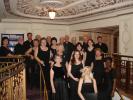
Opera on the Fringe - wonderful! Well, only a concert performance. But what marvellous singing. The city of Manchester Opera is made up of soloists. Together they produce the most lovely sound. And their ensemble is excellent.
The main work was Cavelleria Rusticana sung in Italian with a screen to one side displaying surtitles - a very useful idea. With all the fine voices at his disposal musical director, Chris Gill, had chosen a formidable cast for the principal characters, Margaret Ferguson as the abandoned Santuzza and Eric Cymbir as the unfaithful Turiddu being outstanding.And this was enhanced by some splendid accompaniment by Wendy Dolby. The great climax of the Easter Hymn, enhanced by judicious use of the massive St John's organ, was simply breathtaking.
The concert had opened with a number of short extracts from various operas allowing other members of the group to demonstrate their solo skills. It was notable that all works were sung in theier original language of composition. Most of these were very familiar but there were lesser known pieces as well such as the extract from Adriana Lecouvreur by Francesco Cilea charmingly sung by Annette Reis Dunne.
For Opera lovers this programme is just the thing for a Fringe. It provides an opportunity to renew acquaintance with different masterworks and to discover music not heard before.
P.L.
Orchestral Concert - Amaretti Chamber Orchestra
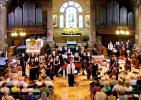
Amaretti is a group of around 25 string players formed in 2004 from ex-teachers and orchestra players. They play for the companionship of making music together and the friendly atmosphere is contagious. They have been regulars on the Fringe since 2005 and now have a loyal following, easily filling St.Johns.
This year ' s concert, raising funds for the L'Arche charity (supporting those with learning disabilities), combined the familiar territory of English string music with the more unusual large chamber work Richard Strauss' Metamorphosen. This latter piece has 23 string parts - requiring guests to play an extra cello and bass. And we mustn't forget to mention the delightful harp playing of Louise Thomson who is now a 'friend of Amaretti'.
So with introductions over, what about the music ? Firstly Britten's Simple Symphony, based on childhood tunes. Of course, we were all waiting for the Playful Pizzicato (awkward page turns in this one), but the Sentimental Saraband gave a first taste of deep resonant and melancholic ensemble playing - making full use of divisi parts. The Finale sounded fiendish with tricky entries for all parts and rousing climaxes - a strange sound combo with a mix of middle eastern motifs and Elgar richness, but worked well.
The Vaughan Williams 5 Variants showed Amaretti in their element - a sumptuous sound, with violins on the G string at the start, building up to the higher octave. The variation with solo violin (Mary Andersen) with harp was delightful. We should see the harp more in a chamber orchestra setting, it really lights up the music. The variant for solo cello (Mary Dainton) with first violins had a lilting melody very nicely balanced. The overall piece was very popular with the audience.
To end the first half, we moved to Amaretti's stamping ground - Elgar. Sospiri is not often performed, it is a short fairly sad, haunting piece first performed in 1914 just before the First World War. It would be interesting to see what this would be like with the original organ part.
After a delightful interval with tea and cakes, we were all refreshed and in anticipation of the Strauss. This is an ambitious work for any group with all players being soloists, so nowhere to hide. There is outpouring of emotion, with a string ensemble ideally suited to creating a romantic texture. I noted the extended G string on the lead bass to create a low C on demand - nice! There were many changes of texture and key, with only a few sections with all parts. Of note was the excellent cello playing (Mary particularly), holding the group together, and the sections with all players were very impressive, making a very rich intense sound - as you might expect with very full harmonic writing.
So, yet again, Amaretti hit it off. This was a very enjoyable and popular Fringe event and, as a former Fringe award winner, they will be playing as guests at the Fringe 30 launch on November 7th in the Opera House - so catch them there.
Martin Bisknell
Purely for Pleasure - Maia Singers
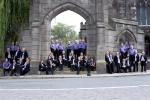
What a pleasant way to spend a summer evening. The Maia Singers from Stockport provided the music with readings from professionals Delia Corrie and Charles Foster. This was a melodic and whimsical programme with a light touch.
The 37 strong choir conducted by John Pomphrey gave us a insight into their varied repertoire beginning with Pastime with Good Company written by Henry V111 in one of his more joyful moods to a selection from George Gershwin's magnificent Porgy and Bess.
In between there were folk songs, a splendid jazz mass by Bob Chilcott, a Tequila Samba and The Teddy Bears Picnic.
The choir are polished and well rehearsed. They obviously enjoy singing together. I would have liked a little more emotion and attack in Porgy and Bess but this is a minor observation in what was a very entertaining evening.
I particularly enjoyed the sensitive piano accompaniement from Ian Tate and the fantastic acoustics of the Buxton Methodist Church provided a perfect setting for the choir.
Delia Corrie and Charles Foster are a great double act. Delia trained at RADA and has worked extensively in the theatre and on television. Highlights of her readings for me were Time by Joyce Grenfell and a description of My Sitting Room at Chatsworth by the Duchess of Devonshire. Delia has great presence and a terrific range of voices which allowed her to glide effortlessly from comedy to more poignant observations on life.
Anyone used to seeing Charles Foster as one of the faces of continuity announcing at Granada Television - where he worked for twenty years - will have been pleasantly surprised to see he is also an accomplished actor too. His reading of Alan Bennett's Journey to Howarth sounded uncannily like the great man himself.
All in all this was a relaxing and entertaining evening of music and readings. It was well presented and the setting was ideal. It was a pity for the performers that the audience wasn't bigger but those who made it through the summer drizzle certainly made them feel welcome.
Colin Sykes
Recital of Piano Music by João Souza Lima - Emma Souza Lima

We were treated to a talk and recital in the Methodist Church on the distinguished Brazilian pianist, teacher and composer João de Souza Lima. The talk and recital were delivered by Emma Souza Lima who was first his student, then his assistant and became his daughter-in law, performing with him in piano duets. She is now on a European tour promoting his work.
The work of João de Souza Lima is not well known in this country. He left Brazil to study piano, composition and conducting in Paris at the Paris Conservatoire. His work has strong French and South American influences. and includes a wide range of compositions including orchestral, chamber music and film music and one opera.
After a short piano piece, we were treated to a fascinating talk illustrated with slides of the life of Souza Lima, with a recording of Souza Lima playing in the background.
She then played a number of piano pieces from memory movingly and expertly. These demonstrated the breadth and quality of his work.
One felt the link to the composer - that here was someone playing the music who knew both the composer and his work and played it as he wanted it to be played. One number was dedicated to Emma Souza. There was a wide range of styles, from the first number, Child Song through waltzes and preludes. Jazz was one of the influences on his work and Brincando de Jazz (Playing with Jazz) reflected his interest in jazz.
The encore, Mozkowski - Etude No6 was a lively piece she played beautifully with passion and enthusiasm.
Mike Rose
Renaissance and Baroque Lute Songs - Accordes
Another enchanting evening with Accordes - Roger Child with a handful of stringed instruments, Sasha-Johnson Manning (soprano) & Holly Marland (mezzo) with voices, various recorders, and another stringed instrument. If beautiful performance of early vocal music is your thing, and you were not in last night's audience, you missed a treat.
This is delicate small scale music, with solo voices and instrumental lines winding around each other, small rhythmic and chromatic effects having more impact than they would in a heavily scored modern context. The audience was clearly captivated, totally still and quiet, and reluctant to break the spell, even for well-deserved applause.
The music performed was secular, 16th to 18th (just) Century, English, French, Italian, Spanish. There were love songs, lullabies, "jolly little ditties" (to quote one introduction), a drinking song, laments various, and some purely instrumental pieces. The English songs included several lovely Anons and John Downlands with that quality of enjoying a delicate melancholy so characteristic of the early part of the period.
This is relaxed music-making of a very high standard - these are, after all, professionals - where the individuals complement each others' qualities and the ensemble is very satisfying. Roger Child plays anything stringed, it seems, while Sasha's voice is satin, perhaps, to Holly's velvet, the combination at it its best, magical.
Ursula Birkett
Sam Dunkley - Sam Dunkley

You may have seen Sam on the Fringe last year, when he took the Best Music Performer award - but even his own publicity still says "Never Heard of Him"! Formerly a Birmingham lad and now living in Yorkshire (Huddersfield), Sam is still fairly new in the world of folk music but has created a unique blend of traditional acoustic pop. To quote from his website: "at the age of 25 he already has a vast amount of performance experience and has spent the last 5 years finding a style and repertoire that appeals to traditional 'folkies' whilst interesting a whole new generation. Sam sings about real stories; real emotions; real people. He makes a connection with his audience so that they actually listen to the songs, rather than just hearing them."
He is indeed very engaging and personable, and involved the audience in several sing-along choruses. He is a funny and musically talented guy who should do well in his career. Regarding material, I would agree with comments in the CD review on his website, perhaps he is trying too hard to be all things with his mix of musical styles and humour. As a Fringe we could take something a bit more style-focused, rather than mixing the folk-club and the social-club - commendable though it is to be flexible, although this may appeal to others?
Sam's strength is his singing and writing - although he is an accomplished keyboard and guitar player, his voice is his best instrument. What the gig needed was more original material, and perhaps taking along a couple of other musicians for backing might let Sam concentrate more on his singing. I particularly enjoyed the ballads though, when his vocal really hit the mark.
So prepare yourself for such "classics" as 'Are you Alright', 'Go Lassie Go', 'Waiting on an Angel' , 'Chavs on the Moon' and 'All Through the Night' (yes the one you know) - so he does have a set list after all !
I would recommend going down next Friday or Sunday to get a taste of Sam - he's good value and will make you feel good and relaxed after a busy Fringe afternoon.
Catch more of Sam on his website www.samdunkley.co.uk where you can also order his album 'Stepping Stones'.
Martin Bisknell
Second Annual 'Folk Concert' - Full Metal Waistcoat
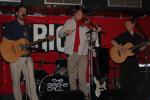
If I was disappointed last year to find out how good FMW were, imagine how I felt this year - they're even better! Even worse they had Tim deputising on violin with minimal rehearsal. They know how to make an old man feel bad.
If I tell you that FMW started with Raggle Taggle Gypsies and finished with John Barleycorn that will give you a fair idea of what to expect musically. What it won't tell you is how the songs are delivered. Many young folk musicians take songs from established performers and simply re-present them. FMW really care about these songs and ballads and sing them as though it was for the first time. The emphasis with FMW is very much on uncovering the meaning in the song. That said when they do borrow a song they stand comparison with the original sources - however celebrated (Carthy, Spiers and Boden...)
So, for example, Lincolnshire Poacher is usually delivered at a jolly pace, a bit of a sing-a-long. FMW, by slowing the song down, uncovered a poignancy I hadn't heard before.
FMW have grown in confidence since last year; they have a little more stagecraft too. They can do tender (Crazy Man Michael) and they can also let rip (Matty Groves - not that much Fairport in the repertoire I should add).
FMW are: Vince (bass, vocals), Tim (violin) and Nick (guitar, vocals). They use what might be a limited tonal palette intelligently varying tempo and dynamics so as to keep the audience engaged.
This isn't exactly a farewell tour - but take the chance to join them while you can.
Keith Savage
Songs from Life - Edward D'arcy Hatton

Edward d'Arcy Hatton, on the brink of his Covent Garden début, graced the Fringe with a wonderful performance last night. He presented a varied programme which showed his huge vocal range and his ease in singing pieces varying in style and period from Dowland to Gershwin.
The concert opened with Mozart's La Vendetta from the Marriage of Figaro, and Edward makes an impressive Dr Bartolo, not only in the fury expressed in his voice but in the whole dramatic presentation of the part: self-regarding, pompous and vengeful. This performance set the standard for the rest of the evening for Edward is always thoroughly in character whether as the awkward and potentially violent giant Polyphemus singing Handel's Ruddier than the Cherry, or as Don Quichotte by turns full of angst or in raucous drunken good humour in Ravel's Don Quichotte à Dulcinée, or as Sporting Life sardonically preaching It Ain't Necessarily So.
Tim Mottershead accompanied Edward with great sensitivity sometimes contrasting, sometimes echoing the dynamics of the singer but always in emotional connection. In Vaughan Williams' Sky above the Roof voice and piano melded in a beautiful evocation of grief and loss. In Reynaldo Hahn's L'heure exquise, they were a duet with separate but equally delicate parts depicting the shy hesitant progression to a first kiss.
It is clear that the words and meaning matter greatly to both Tim and Edward. This was especially evident in their presentation of the works of Ronald Stevenson - Tim's teacher and mentor who is soon to be celebrating his 80th birthday. In Songs from Factories and Fields (Stevenson's setting of the poems of Hugh MacDiarmid, voice and piano both had roles to play in the expressive dialogue concerned with the lives of ordinary people.
We all wish Edward success in his new venture, but hope he will find time to return with Tim to a future Fringe.
Barbara Wilson
String Quartet Masterpieces - Quatuor Deconet

What a wealth of music to enjoy in Buxton in July! Music on the Fringe is flourishing, with something for almost all tastes, almost too much to programme into any one person's listening fortnight, whatever their preferences. Mine being for the classical, last night brought me to an amateur string quartet making its Buxton debut, The leader, Louise Latham is a professional player, and the group is named for the maker of her 18th century violin. The players, Louise, Nicola Bright, Mary Anderson and Mary Dainton, are all part of the flourishing local network of small orchestras & chamber groups, many of which have appeared at the Fringe.
Their programme gave us quartets from each of the 18th, 19th & 20th centuries, Haydn ('charming'), Brahms (romantic'), Janacek (brilliant'). It was perhaps a kindness to the audience to put the Janacek in the middle of the sequence, since he is the most demanding listening, being least familiar.
Haydn himself said "Since God has given me a cheerful heart, He will forgive me for serving Him cheerfully". His quartet Op.2 no 2 is a piece to cheer an audience, with tunes, accessible harmonies and forms, some drama, and a fine flourish of fugue to conclude. It was played here with enjoyment well conveyed but also private, as often happens with chamber music groups.
Janacek's second quartet "Intimate Letters" is considered his finest chamber work, not exactly programmatic, reflecting on his long friendship and love for his much younger woman friend Kamila. The work is tonal, but "not in the traditional sense" (as Wikipedia truly says), and reflects Janacek's interests in folk music and natural sounds. It is a challenging work for players and listeners, and was carried off handsomely. The viola, said to represent Kamila, was especially warm.
Finally there was Brahms' quartet in A Minor, Op 51 no 2, the leader's Desert Island choice. This is beautiful music in traditional forms, 'pure', not programmatic, but nonetheless full of emotion, both yearning and joyful, and with moments of Brahmsian delight - possibly his, certainly ours.
You can catch some more of these and other local players with the Amaretti Camber Orchestra, on Saturday afternoon (26 July) - always recommended
Ursula Birkett
Summer Concert - High Peak Orchestra
A capacity audience in St John's Church gave an enthusiastic reception to another fine programme from the High Peak Orchestra whose concert has now become one of the musical highlights of the Fringe.
The high point of the programme was Martinu's oboe concerto. Composed in 1955 the work is not well known but in fact the music is readily approachable and enjoyable. A great coup for the orchestra was soloist, Richard Simpson -principal oboe with the BBC Symphony Orchestra and president of the orchestra. And we were not disappointed. Richard gave us a spirited but sensitive interpretation of the work marvellously assisted by his wife Janet playing the piano part, almost as demanding as the oboe solo.
The programme had opened with Dvorak's twenty seven variations Op 78. These variations are very much in the strong nationalist tradition which colours almost all of Dvorak's compositions. There is no affectation in his music; just simple clarity of expression which the orchestra caught very well in their performance.
The programme concluded with a strongly romantic performance of Tchaikovsky's Symphony No 5. In this work the composer makes serious demands on the orchestra particularly horns and clarinets. But they rose magnificently to the challenge and the result was one of the best performances from the HPO that this reviewer has heard in many years of attending their concerts. It is amazing how Andrew Hodkinson continues to develop their abilities.
P.L.
Summer Concert - Manchester Recorder Orchestra
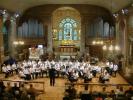
It is lovely to welcome the Manchester Recorder Orchestra to the Fringe again this summer. For those who haven't had the pleasure of seeing them yet, their concerts are an opportunity to appreciate the full range of voices of the recorder family from the high clear sopranino to the deep fluid contrabass.
This year's concert opened with the popular Overture from Rossini's L'Italiana in Algeri and built, under Ian Chester's direction, from the slow beginning to a wonderful galloping rhythm. Next came a modern Jazzy piece by Marshall: The Swan in the Evening. Emma Leyden, playing descant, beautifully and plaintively set the theme of She Moved through the Fair, and she picked it up in the moods and tempi in the variations that followed. These were sometimes charming as in the Echoes, sometimes humorous as in The Duelling Recorders. The first of these was a showcase for all the voices, the second a battle between the sopranino and the contrabass. I think the sopranino won but the contrabass blew a wonderful raspberry! The first half finished with Holst's Second Suite in F (played in C), a piece full of reference to folk melodies. The orchestra here showed the recorder's potential for complex colourful arrangements as in the weaving of an Irish jig with Greensleeves in the Song of the Blacksmith.
After the interval, and now under the direction of David Walsh, we were treated to Pictures at an Exhibition, Mussorgsky's tribute to his friend Viktor Hartmann. This piece has seen many arrangements; this one was specially written for recorders and it shows again the instrument's capability for a great range in mood and complexity. I liked the somewhat weird and spooky evocation of the Gnomes, the playful Ballet of the Unhatched Chicks, and the air of celebration and final majesty of the closing Great Gate at Kiev.
At previous performances I've seen, the Manchester Recorder Orchestra has invited a guest soloist, a brass player for instance, to play with them. There wasn't one at this concert. I hope this was at least partly a reflection of the orchestra's confidence that they don't need added colour - they can provide it all themselves.
Barbara Wilson
Summer Serenade - Cantores Novae with guest artist Alison Bletcher
Sheffield-based Cantores Novae is a choir of international standing - former finalists in the Sainsbury's Choir of the Year and Choir Champions of the 2002 National Eisteddfod. The choir, with ages ranging from 13-60+, sing mainly 3-part, with some 4-part music for women's voices. Tonight their founder director Vivien Pike was unavailable, called away to adjudicate at the World Choir Olympics (!), but their regular accompanist Eleri Davies ably left the piano stool to conduct the 20-strong choir through a varied programme, and provided informative introductions. The stand-in accompanist was Andrew Cummings, well known in the town in his roles as teacher, accompanist and organist.
Tonight, the choir was joined by the accomplished recorder player and music teacher Alison Bletcher, who organised the staging of the concert having made contact with the choir last year. A feature of Alison's performance is the introduction to the pieces, enhancing the musical understanding of the audience, and creating a relaxed atmosphere. She plays with a very fast vibrato for much of the time, making the recorder sound almost pan-pipe in nature.
The programme with 'something for everyone' was split into choir and solo recorder sections, some with piano or organ, with a combined item at the end.
After an Italian madrigal (with drum), we were serenaded by the beautiful harmonies of Cantores in Poulenc's motet Ave Verum Copus. To end this first set we heard a more pacy modern piece by Andrew Carter, the Choirs patron - quite Rutter-like in style.
Alison's first set started with the classic Greensleeves to a Ground played lyrically on descant - and expertly played. She then switched to treble for the virtuosic C major sonata by Telemann - this showed off some very fast playing around the 2 slow lyrical movements, perhaps a few more improvised ornaments in these? - but this was a mature reading. The movement from Sammartini's F major Concerto was really at the quick end of Allegro and was a 'top' performance. To complete this first section, Alison swapped to the smaller sopranino for the crowd-pleasing Tambourin, which gained much applause (and kept the piano busy too!).
Cantores' second set contained the Salve Regina by Kocsar, a very slow piece where the silences form a part of the music - and climaxed to the finish - very effective.
After an interval, where money was raised for the Chernobyl Children's charity, and I learnt that Cantores had been to the Cardigan Eisteddfod the previous Saturday, we had a third set from the choir featuring solos from several choir members in the Good News spiritual.
Alison's second set again provided a mix for all tastes. We had the expressive Satie Gymnopedie on tenor, a demonstration reel on the tiny 6-inch garklein, and easy-listening sets of swing (Alison clearly enjoyed playing the spiritual) and well-arranged TV themes. However, the Murrill sonata was where Alison showed her deep understanding of mid-20th century repertoire - she was in her element in this freely expressive music.
A lighter final set from Cantores with the crowd-pleasing Nella Fantasia (better known as music from the Mission), and Lullaby of Broadway led to the combined item 'Flying High' by Besig - a peaceful, lyrical end to an excellent concert.
With a mix of mature and gifted choral singing, combined with virtuoso recorder skills, all had a very satisfying night out in the wonderful acoustic of St.John's - and with the useful introductions from Eleri and Alison, we all learnt something too.
...and what an audience - 90 in all, which must be a Fringe record!
Let's hope they come back next year.
Martin Bisknell
Tales From the Cutting Room Floor - Steve Lake & Project Adorno
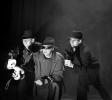
Synth and performance duo Project Adorno have become something of a regular fixture at the Buxton Fringe in recent years, mixing studied banality of delivery with electro-pop for the masses. This year they are joined by Steve Lake, anarcho-punk frontman of Zounds for something a little different.
This show comes in three parts - three short films, fused with live performance. For the first part - The Ministry of the Mundane - Adorno are on familiar territory, playing Kafka-esque bureaucrats endorsing recycling schemes and telephone boxes in simple electronic song. It was droll and effective.
However, for the second part - Tales from the Cutting Room Floor - Steve Lake took to the stage for something altogether darker. To the accompaniment of a silent film of gangland murder and treacherous molls, Lake takes to the stage like a sinister fairground barker in glittery top hat and carrying a clear plastic umbrella, reciting a tale of youth cut down by corruption. More like an angry jazz poet than the more good-natured Adorno's Kraftwerk-style descriptions, Lake's tone becomes increasingly ranting and, while unquestionably exciting and full of showmanship, hard work for the audience. By the end of his segment I for one felt somewhat bludgeoned and worn out, and certainly not up to enjoy fully the return of Adorno to the stage with a piece eulogising Eric Satie (something of a spiritual inspiration to electro-pop and avant garde alike).
There is no question that, if one was to think of a show that illustrates the word 'fringe' this would be it, but although I'm glad I saw it, it will undoubtedly not be up everybody's street.
Robbie Carnegie
The Language of the Blues in Words and Music - Ruby Highway Band
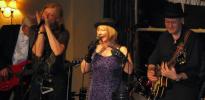
Last night's show was a gentle stroll through the history of the Blues, and even for those who knew something of the genre there was something new.
The Ruby Highway Band is a local group and are no strangers to the Buxton area, indeed members of the local music scene were in the audience. Nonetheless they provided a show which with perhaps more promotion would have been better attended by both locals and visitors.
Led by the affable 'Howard the Bassman' we were introduced to the music, people and history of a music that has seen countless imitators over the years. Howard also highlighted some of the culture around the songs which have become familiar to many of us, often via young whippersnappers such as the Rolling Stones and Led Zeppelin.
In short, this was a useful, interesting and enjoyable show for both aficionados and newcomers to the subject.
Ian Heath
The Melody - The Aoife Hearty Trio

Aoife Hearty is a jazz singer from Leeds. Although billed as the Aoife Hearty Trio, this concert was from her and a guitarist. She has a pleasant, slightly smokey voice and she understands where to sit a song in her vocal comfort zone (although I particularly liked the moments when she loosened up and utilised her upper register and when she let rip and belted). I have to say, however, I was less happy with the mid-Atlantic, Billie Holliday-ish pronunciation which she adopted throughout which slightly robbed her performance of its own identity. I appreciate that jazz is essentially an American musical form and, like rock 'n' roll or rap, is hard to pull off without a touch of the States in ones delivery, but I couldn't help thinking that a touch more of her native voice in the mix.
Aoife began the concert with three of her own songs and certainly judging by the repeat of one that she undertook at the end of the show, they repay further listening. She then embarked on a trawl through the Great American Songbook - I have been known to say that if I heard another version of Summertime or Fever I'd scream - but to her credit she accomplished these songs well and the audience certainly liked her interpretations. As the concert reached its end, however, she admitted that she wasn't used to playing an hour's set, and the cracks certainly began to show in the last few numbers - at times her voice and the guitar seemed out of step with each other, whether as the result of jazzy improvisation, or because something had gone wrong I can't say.
There is no question that Aoife Hearty has ability, but a bit more experience would work wonders to take her to the next level of vocal confidence.
Robbie Carnegie
The Music of Romance - KEMS Orchestra

The King Edward Musical Society from Macclesfield made its fourth appearance on the Fringe this summer offering an interesting programme based on the theme of romance.
They opened with the Overture of The Caliph of Baghdad by François-Adrien Boïeldieu, a highly popular work in its day. In this opera, the caliph in disguise as a brigand woos his lady love Zétulké but runs into opposition from her mother because of his apparently lowly birth. The orchestra conveyed well the exotic eastern flavour of the setting, and the contrasts of moods, and the ups and downs, of the coming story. The triumphal ending of the overture was particularly striking and indicated all would be well for the lovers in the end.
Wagner's symphonic poem Siegfried Idyll followed. Written by Wagner as a present for his wife Cosima, it was performed for the first time for her as she awoke on her birthday. Conductor Anthony Houghton had introduced to us the personal allusions contained in the piece particularly the references to the Wagners' son Siegfried. Although there were some difficulties with intonation in the strings, the performance was nevertheless full of colour and evocative of sunrise and birdsong.
After the interval came what was for me the most romantic piece of the evening, Beethoven's Romance No 1 in F Op.50. Leader Alfred Barker gave a wonderful performance of the solo violin part, a lovely aching melody, which seemed to inspire confidence in the rest of the string section.
The final piece was Bizet's Symphony in C written remarkably when he was only 17. The highlight here was the Adagio featuring a plaintive, sensuous, oboe solo played beautifully by Jacquie Grinham.
This was a very enjoyable programme and performance and, incidentally, a highly appropriate way to celebrate our wedding anniversary!
Barbara Wilson
The Story of Jam - Chapel Youth Centre Jam Nite
This not a show about preserves (ha-ha!), but about the creative endeavours of the youngsters (aged 11-19) of the Chapel Youth Centre 'School of Rock'. To quote the group's blog: "the group are performing three nights of original music and writing they have created over the last 6 months...all members of Jam have helped in everything needed to put on the show - music, lyrics, recordings, remixes, backdrops, staging, production, leaflets, brochures, plans, risk assessments, venue, brochures, tickets, planning, rehearsal, publicity and a great story - phew!! The group have been planning this performance since February half-term, and have been meeting every week to practice, throw around ideas and write a show, the product of which is being unleashed on the world this week!"
The upstairs room at the Grove was very bijoux and set out in the round with the audience in the centre. The group performed in glorious day-glo Fringe orange t-shirts (available from the Fringe Desk), and the atmosphere felt very welcoming and friendly. All the group contributed to the multiple band line-ups and played in a range of styles from Pink Floyd to Punk - one section even sounding like 'House of the Rising Sun'. So rocky style in the main, but with some well-written acoustic numbers too.
One of the main features of the evening was the alternation of live music with recorded sessions (made by absent members). These recorded numbers were more acoustic in nature and featured a few stanzas each time of the specially written Fringe Poem, printed in the gaily coloured programme. Hopefully we can get the poem on the Fringe website.
The first half of the show was written especially for the Fringe, the second half favourite jam numbers. One of the highlights for me was the Whale Song - this is where the whole group combined in an instrumental number with whooping bass guitar and word-less vocal - very effective and most evocative of our marine friends. Other highlights were the Quo-like 747 and also Fly Away, an accomplished solo guitar ballad which quite mesmerised the audience.
In summary, this was 'Noughty' youth at its best - exhibiting what can be done with talent, commitment and careful guidance (well done Dan!) - a very positive and inspiring display.
You can catch Jam on the 10th and 11th at the Grove at 6.30pm, and at Fringe Sunday on the 13th. This is a show that is quite rightly on the Fringe - original work by young people in a friendly and safe environment. Let's hope they come back next year.
Story of Jam blog: http://storyorjam.blogspot.com to catch up on all the latest happenings.
Martin Bisknell
Tideswell Male Voice Choir in Concert - Tideswell Male Voice Choir
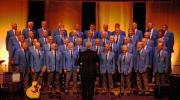
As a recent convert to early choral music one can often find me listening to the 'Tallis Scholars' or 'Kings College Choir', so the thought of being dragged out by Mrs Flett to listen to a dusty old bunch of duffers singing songs from the shows filled me with dread. In fact I had planned on feigning some dreadful acute illness which rendered me couch bound for the evening.
Notwithstanding any of this kind of tomfoolery, I often find that these things are not half as bad as you think they are going to be once you have torn yourself from the womb-like comfort of the armchair and put your shoes on, besides which, Mrs Flett reminded me of our old insurance salesman Nigel Willis who sings with the TMVC. Well that was it then -'he's almost family' I muttered under my breath pulling on my trainers.
On our arrival the boys had just launched into their first number. I remember thinking "well this could have been worse" and the rest of the programme just got better and better as I became less and less cynical. The Musical Director the jovial Dennis Kay was into audience participation in a big way and he soon had the audience joining in and augmenting the glorious sound that was the TMVC. (shhh don't tell everyone but, what was worst of all the buggers almost made me shed a tear or two...Almost I said!
So as well as enjoying an excellent musical evening with a genuinely nice bunch of blokes I learned a valuable lesson in my ignorance and arrogance, that any song however modest, sung with enthusiasm, passion and sheer joy will sound any bit as good as any Agnus dei or a Spem in Alium. Highly recommended.
Mark Flett
Un/Plugged: Amplified and Acoustic Trios - Expatrio
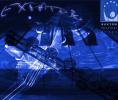
"Experience the passion and artistry of one of the world's newest and brightest chamber music ensembles as it presents an adventurous programme" It said in the Fringe description. I should have known that when any recital is advertised as 'adventurous' it really means it's a challenging listen.
I have to say right from the get-go that I was the last person who should have been reviewing this performance. Anyone who knows me, knows that I'm a tell it as I see it kind of guy. If one took a quick glance at the programme notes, one will see passages like "Martinu instructs the pianist to play fortissimo (twice in the exposition of the Allegreto and twice again in the recapitulation)" It's phrases like this that alienate me, make me feel uncomfortable, and lessens the accessibility of this kind of music. I'm just a horny-handed son of toil. Ok ok, I'm in IT management but I try and keep my clients with me and not talk too much about APIs, dynamic link libraries or systems oriented architectures.
Adrian Calef (cello) Fiona Corston (piano) and Anna Zweck (flute) made up tonight's line up of Expatrio. I figured that they must be very talented and well educated musicians as their post nominal letters read like a really bad hand at scrabble. This was 'new music' and I for one have mixed feelings about the word 'new'. New Labour, Novelle cuisine etc. Need I say more?
The first piece was Vox Balaenae (Voice of the Whale) by George Crumb. Not a household name but what is interesting is that Crumb insists that; "each of the three players should wear a black half-mask...throughout the performance of the work". He goes on to rationalise this by saying it will "symbolise the powerful impersonal forces of nature" - give me strength!.
I guess the nearest performance in my personal music collection that describes this first piece would be Brian Eno's 'Music for Airports' if you know it, you'll realise it's not sit there and listen attentively music, it's sonic wallpaper, you know... drowns out the sound of the washing machine downstairs or the traffic on the road outside while one works. The first part was er... well let's put it this way, I would be glad of the mask if I was playing it. The last movement however (Cenozoic (Var V)) was really pleasing and mellifluous, so not all bad eh?.
The middle piece was the best it was Trio for Flute, Cello and Piano. I thought this was an excellent choice as these are just the instruments that the musicians brought with them. Other reviewers far more learned and infinitely less cynical than me use words like genial, good-natured and charming. These are words I would recognise in this piece and it was a blessed relief from Crumb's whaley thing.
And onto the final piece - not just jazz, new jazz.(sigh). The piece was Trio for Flute, Cello and Piano, Op 86 (good choice again Expatrio) by Nikolai Kapustin Excellent physical work-out for the attractive Ms Corston - she was up and down the keyboards like a woman possessed but still managed to remain graceful and smiley throughout. There were moments however, when it sounded like an upright piano falling down a flight of stone steps but these were few fortunately.
Look- let's be absolutely clear. These were three top flight musicians playing complex works, complex and very challenging at times to the average man in the street. Fringe festivals such as ours are valuable opportunities to be exposed to all types of art, however challenging. I'm a cynical old bugger and sometimes I write to get a laugh. Please - go and see this performance, do not be put off by my lack of musical knowledge, my abysmal approach and my cynical philistines pen. There is something of great value here, but to acquire a pearl, one has to persevere with the challenge of the shell.
Mark Flett
Underground Jazz Club - Underground Events

For two people that told us they'd only been playing together for a week, it just seemed to click when they started to play. You'd never have guessed they'd only rehearsed Montgomery's '4 on 6' that morning. With just a guitar and a bass, playing jazz pieces from legends such as Charlie Parker, Joe Henderson, and John Coltrane, this is fresh jazz you should not have missed.
The fuzzy amps only added a new old needle/vinyl touch to the jazz and the incredible yet effortless improvisations from both Graham and Emlyn provided an easy listening evening; just how jazz should be.
In contrast to the jazz, Graham and Emlyn were joined by a Brazilian singer, Betto, whose mellow tones provided us with some classic Latin tunes such as 'The Girl from Impanema' and 'Wave'. With the audience joining in the choruses and an encore asked for at the end, this evening proved to be a success.
You can also check them out at Beltane on Thursday 31st July with a full band and more Brazilian tunes and jazz.
Catch more jazz with The BB Jazz Project (Trish Brown and Liam Morson) - Thursday 17th - 1:30pm to 3pm, 10pm to 11pm
Pearl Jazz - Sunday 20th & Thursday 24th - 1:30pm to 3pm, 10pm to 11pm
Tasha Bisknell
Words and Music from the Wild - Running Free

Christine O'Malley and Susan Gaukroger have been friends for thirty years and share a similarity of background, both coming from towns in the north of England, Christine from Blackburn and Susan from Halifax.
Christine's songs and Susan's poetry both reflected these connections.
Their choice of material centred on early childhood memories and influences and aspirations and hope for a future sustained by creativity and the support of friends.
The unusual alternation of song with spoken word worked very successfully.
Christine has a delightful voice with a wide range and the words of her songs were clearly articulated and expressed with feeling.
The words and rhythms of these original songs possess a definite style which identifies them clearly with the writer. However, a whole programme solely given to them might have seemed a little lacking in tone and variety. This possibility was offset by the juxtaposition of the music with Susan's poetry which provided an exciting and stimulating contrast.
Many of Susan's poems use the metaphor of landscape to explore both mood and emotion and were read with passion and strength. She has a unique personal style
which deserves a wider audience.
Christine has recently produced an album on CD 'Artemis Grace' which she offered for sale on the evening.
I would have liked to be able to purchase a copy of Susan's poems. Perhaps next time.
Unfortunately the audience was small probably owing to the rural location and the early start and that Christine and Susan are new to the Fringe as a 'double act'
I hope to see them again next year
Sheena Barnes